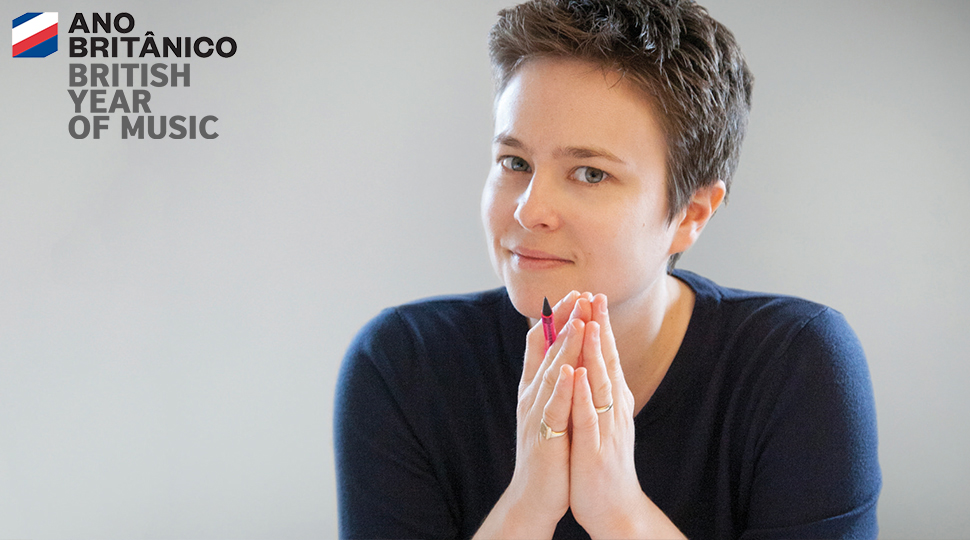2017 is the Year of British Music in Porto, Portugal, and the Casa da Música will play host to wonderful British composers past and present through a programme of shows and events brimming with the best of British classical music.
The Year of British Music opened with a flurry of activity over its first weekend in January and, supported by the British Council, four young composers travelled to Portugal to showcase some of their work. Among them was Emily Howard and we caught up with her to talk about her music, her interests, her time in Portugal and how the changing relationship between the UK and the EU might affect future music making between the UK and the continent.
How would you describe your music and what drives and interests you?
Emily: I write concert music (works for orchestra, chamber music) and music for stage (opera, music theatre), often with significant links to the worlds of science, mathematics and poetry. Personal connections with musicians and ensembles are very important to me and shape each individual piece. I’m driven by conversations and collaborations leading to ideas from eclectic sources – the more the merrier! There is no getting around the fact that writing music is for the large part a solitary act. I find it deeply rewarding creatively to balance this necessary “alone-time” by collaborating with people who have wide-ranging interests and experiences including regular discussions with mathematicians, poets, scientists, writers and many others. I like to view each new work as a musical reaction to a broad range of extra-musical influences collectively. It’s the resulting collision and union of disparate ideas from diverse sources that excites me, and the subsequent translation of these hybrid ideas into sound is essentially the crux of my creative process.
How did you get started in music and composing?
Emily: When I was young, I played the cello and I always found myself far more interested in exploring new sound possibilities than engaging in disciplined practice of established repertoire and exercises. I grew up in the Liverpool area and was lucky enough to have a strong connection with the Liverpool Mozart Orchestra, an amateur orchestra that my father played cello with. I wrote them a short piece when I was about ten and I still remember the excitement of hearing them play it through in their rehearsal. I also loved science and mathematics and took an undergraduate degree in mathematics and computer science at the University of Oxford before postgraduate degrees in composition at the Royal Northern College of Music and the University of Manchester. I consider myself fortunate to have had such strong support from organisations including the London Symphony Orchestra and the Royal Liverpool Philharmonic Orchestra in my early years working as a composer. In 2007, I was selected for the LSO Panufnik Scheme giving me the chance to experiment with a world-class orchestra away from the concert platform – in retrospect an invaluable learning experience. Shortly afterwards, I received my first professional orchestral commission Magnetite for the RLPO and Vasily Petrenko, part of their Liverpool European Capital of Culture Season in 2008 (alongside Beethoven’s 9th Symphony – I remember that being quite scary at the time!), and then a UBS Soundscapes: Pioneers commission Solar (2010) for the LSO and Nicholas Collon followed.
How did you find the Casa da Música showcase in Portugal? Was it beneficial to you as a composer?
Emily: I was really pleased to receive the invitation to the Casa da Música showcase, not least because it was a chance to hear live performances of two brilliant works: Skin by Rebecca Saunders – my second chance to hear the piece having attended the UK premiere at the Huddersfield Contemporary Music Festival 2016, and Earth Dances by Sir Harrison Birtwistle – the first time I have had the opportunity to hear Earth Dances live; it’s been on my wish-list for a very long time. It’s always beneficial to have a chance to chat music with your peers. I appreciated the opportunity to spend time with Edmund Finnis, Dan Kidane and Philip Venables, and it was very helpful to connect personally with delegates representing venues, festivals and ensembles from all over Europe. It also felt important to be part of the Brexit debate at this time.
What are your thoughts on the impact that the UK’s changing relationship with the EU will have to music making and to you as a composer?
Emily: I certainly feel that there is something wonderful about being a part of a whole European tradition, musically and in general, and I do hope that the UK’s changing relationship with the EU won’t break down cultural relationships in any way. The honest answer to this question is that I have absolutely no idea about the long-term implications of Brexit. I doubt that anyone really does.
What have been some of your recent highlights and can you tell us about any projects that you have coming up?
Emily: Recent orchestral projects include a large-scale work Torus (Concerto for Orchestra) co-commissioned by the BBC Proms and the Royal Liverpool Philharmonic Society for Vasily Petrenko and the Royal Liverpool Philharmonic Orchestra (to celebrate its 175th Anniversary) that premiered at the BBC Proms 2016. A short new orchestral work sphere (2017) was premiered by the Bamberg Symphony Orchestra conducted by Alondra de la Parra in March 2017.
Currently I’m working on two projects that I’m excited about: The Music of Proof with mathematician Marcus du Sautoy, the Piatti String Quartet and New Scientist Live Festival; and a sci-fi chamber opera with writer Selma Dimitrijevic and director Dan Ayling. More information about these projects coming soon!
- Find out more about Emily Howard on her website
- Listen to audio clips and video recordings of Emily’s work here
- Find Emily’s debut disc, Magnetite, here
- Find out more about the Year of British Music here


